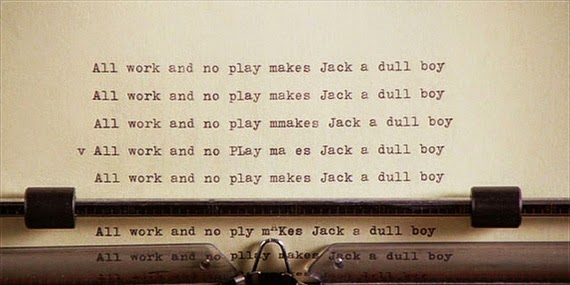
Woman with writer’s block.
Writer’s block—is it real? Is it why writers get stuck when writing, or can’t get started?
Today’s Words of Wisdom tackles writer’s block, with posts by Kathyrn Lilley, Elaine Viets and John Gilstrap. Afterwards, I give my own short take on it, and then open the floor for questions.

I never used to understand what people meant by “writer’s block.” I’d always felt immune to that scribe’s disease. When I wrote the first two books in my current series, I had a machine-like discipline. I’d get up at four a.m. every morning and write for at least two hours. No. Matter. What. My progress was always slow but steady. I wrote almost the same number of pages every day. My writing group members were in awe of me.
But then along came Book Three, and I went into a bit of a slump. Actually it felt more like an avalanche. Even though I loved the story I was working on, sometimes I’d find that days would pass without any progress at all. I eventually had to ask for–gasp!–an extension from my editor, who graciously granted it to me. But even then I kept running behind. Ultimately I made the new deadline, but barely. Now I have a recurring nightmare about missing the deadline, which has replaced my old nightmare about discovering that I’ve missed an entire semester of a class, just before the final exam.
So what exactly is writer’s block? I think the term is a bit misleading. It implies that the writer doesn’t know what to write about — such as a lack of inspiration, perhaps. In my case I knew the story I wanted to write, but I seemed to have lost the daily writing rhythm along the way. Maybe what I had was actually energy block. Or focus block.
So here were a few of my cures for The Block. All of them proved to be helpful at times:
- Write 15 minutes a day
You can write for at least 15 minutes today, even if you’re the busiest person on the planet. Doing that small amount per day helps you get the habit and rhythm back. Over time, your progress will add up. - Write at the same time each day.
I think this is the single most helpful habit that will enable you to break through writer’s block. If you sit your butt down in a chair at the same time every day, your body starts to learn that this is the time for writing. Your writing flow will start to kick in at that time. - Free writing
This technique is where you grab a couple of random words and “free write” them into your WIP for a set amount of time. Actually, this one has never worked that well for me. Whenever I try free writing, I get stuck at the same damned spot that I’m stuck in my regular writing. And then I get even more depressed about my writer’s block. But I know that free writing works wonders for some people. For great tips about free writing and other ways to break through The Block, I recommend Barbara DeMarco-Barrett’s book, Pen On Fire: A Busy Woman’s Guide To Igniting The Writer Within. (Guys can pick up a few tips too!) - Put your writing first
I have many acquaintances who have endless reasons for not writing. Anniversaries, birthdays, conflicting deadlines, vacations, relatives visiting…you get the idea. Unsurprisingly, these people are frequently blocked writers. Your writing needs to be a first priority in your life, or you’ll be doin’ time inside The Block.
Kathryn Lilley—June 16, 2009
My grandfather was a security guard. He worked weekends, holidays, and nights when temperatures plummeted below zero and frozen winds blasted the empty parking lots. He never said, “I don’t feel like guarding the warehouse tonight. I’m blocked.”
My grandmother babysat. She never said, “I’m not watching those brats today. I’m blocked.”
When I spoke at Fort Lauderdale High School, a student asked, “What do you do about writer’s block?”
“Writer’s block doesn’t exist,” I said. “It’s an indulgence.” Writing is a job, and working writers cannot afford writer’s block. It’s a luxury. Pros know that inspiration won’t strike like lightning. We can’t wait for it to hit us. We have to write.
I wish I had a dollar for every day I didn’t feel like dragging my sorry carcass to the computer. I could retire.
But I write because it’s my job. Even on the worst days, I love being a writer.
Many former newspaper reporters become mystery writers, including Michael Connelly, Kris Montee (PJ Parrish), and me. We’re trained to respect deadlines. Writing is our work and we sit down and do it. Early in my newspaper career, I told my editor, “I’m blocked. I can’t write this story.”
“Write something,” he said, waving the blank layouts. “We have pages to fill. We’re a newspaper, not a high school theater program: We can’t leave blank spaces on the page with ‘COMPLIMENTS OF A FRIEND.’ ”
Some days, the words flow, gushing in fertile streams. I feel alive and electric. Other days the words trickle out like water in a rusty, clogged pipe.
But I still write.
What do I do when the words don’t come?
I remember what Daniel Keyes, who wrote Flowers for Algernon, said at a speech:
“When I feel blocked I start typing – anything,” he said. “It doesn’t have to make sense: ababababsjsjsjfjfjfhhshshshkaka.
“Then I start typing words. Any words. The first words that come to mind.
“Next I start writing sentences. Again, they don’t have to make sense. But I keep on typing and eventually they do make sense and I’ve started writing. I may throw out ninety percent of what I wrote that day.
“But I wrote.”
You can, too.
Elaine Viets—March 10, 2016
Truth be told, I don’t believe in writer’s block. There are days when the creativity feels like it won’t flow at all, and there are certainly days when I would prefer to do something other than tying my backside to the chair and hammering out words, but that’s what everybody feels about any job on some days.
“Writer’s block” is, I believe, too often an excuse to be wielded on those days when a writer would prefer to play hookie. There’s nothing wrong with playing hookie, but whilst playing, it’s disingenuous to complain about not getting stuff done on your manuscript. There truly is no substitute to a writer writing, even when the words don’t flow easily.
I think of creativity as a flow, and the writer as the pump. When the pipes are filled and the pressure is even, creativity pours out of us, sometimes in such volume that we can’t handle it all. Then stuff happens in our lives or in our surroundings that causes intellectual cavitation, and our pump loses prime. All that flow reduces to a pool, and it’s hard work to get it going again.
Everybody has a proprietary secret sauce to re-prime their own pipes, but one that always works for me is to return to the basics: pen and paper. I posted a video on the topic on my YouTube channel. I don’t know why it works, but somehow, the tactile connection between my brain and the page, flowing through an old-fashioned fountain pen, never fails to set me straight. For every book I write, I’d guess 20% of the prose starts as being written longhand. Once the story is flowing again, I type up the handwritten pages and I’m off and running.
John Gilstrap—June 20, 2018
***
My personal view is that “writer’s block” is really fear, perfectionism, and/or the inner critic keeping writers from starting or stopping them cold mid-draft. Daring to write a crappy first draft can help. Simply letting yourself write, as all three of today’s WoW posts advice, is golden. Deadlines can also “unblock” a writer.
Feeling blocked can also be a message from the writer’s unconscious that there’s a plot or character issue that needs to be worked out. My go-to in that case is brainstorming, which was featured in a WoW post last December. Going up to what I call the “thirty thousand foot view” of my novel and sketching out the big picture story elements and/or revisiting advice on plotting, such as this JSB’s post here, usually helps fix whatever the problem is.
How about you?
- Do you believe in writer’s block? Or do you think something else is at work?
- What do you do when you can’t get started, or become stuck mid-draft?
- Any general advice about dealing with fear, perfectionism, or how to muzzle the inner critic?
I’ll be on the road for most of the day, but will pop in when I can. In the meantime, please share your take on writer’s block.


















